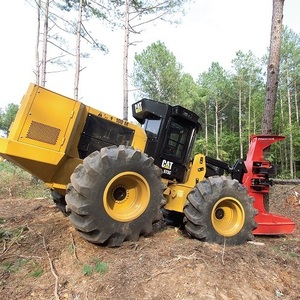Off-road engines, aftertreatment systems perform well on B100

Photo: Caterpillar Inc.
February 20, 2018
BY AGQM
The University of Rostock demonstrates in current research results that off-road engines conforming to exhaust emission category EU Stage IV are suitable for operation with pure biodiesel.
The German government’s climate protection plan 2050 intends a reduction of the greenhouse gas emissions in transport sector by 40 percent until 2030. A reduction of the greenhouse gas emissions of fuels by 6 percent is fixed by law until 2020. Fleet operation with pure biodiesel (B100) is already an opportunity to reduce greenhouse gas emissions significantly.
Advertisement
The research project at the University of Rostock shows the suitability of B100 at an EU Stage IV engine for industry and agriculture. Special attention was given to the operational stability of exhaust gas aftertreatment systems in endurance tests. The use of exhaust gas aftertreatment systems with diesel particulate filters (DPF) and selective catalytic reduction (SCR) is mandatory to comply with the increasingly stricter emission limits for vehicles.
The long-term studies and comparative measurements with fossil diesel fuel at the University of Rostock show that the performance of the engine and the exhaust gas aftertreatment system stays unaffected while using B100. Emission limits and performance parameters can be fully complied with even after 1,000 operating hours.
Advertisement
There was no negative impact on the engine or the exhaust gas aftertreatment system by the biodiesel, which was provided by Germany’s biodiesel quality management association (AGQM) and reflects the usual quality of the biodiesel produced by the members of AGQM. By means of unannounced and independent samplings at producers and traders, the biodiesel quality is verified and ensured regularly. The results of these samplings are published in an annual quality report on AGQM’s website.
The findings of the project demonstrate once more the possibility to use biodiesel in road traffic and the off-road sector to contribute to the achievement of the climate targets for the transport sector. As a reaction to the promising outcome of the project, Deutz AG last November approved all of its EU Stage IV tractors for the use of B100. The tested aftertreatment system is in principle also used for emission category EU Stage V engines, which is why a B100 release appears to be possible here as well.
The project was supported by the German Ministry for Food and Agriculture (Bundesministerium für Ernährung und Landwirtschaft, BMEL), AGQM, Deutz AG and UFOP (Union zur Förderung von Oel- und Proteinpflanzen). The final report can be downloaded on the website of the Agency for Renewable Resources (Fachagentur Nachwachsende Rohstoffe e.V., FNR) under www.fnr.de.
Related Stories
Effective April 1, Illinois’ biodiesel blend requirements have increased from B14 to B17. The increase was implemented via a bipartisan bill passed in 2022, according to the Iowa Soybean Association.
Airbus is taking a significant step toward scaling the adoption of sustainable aviation fuel (SAF) by testing a new “Book and Claim” approach. This initiative aims to boost both supply and demand for SAF worldwide.
Signature Aviation, the world’s largest network of private aviation terminals, has announced the expansion of its blended SAF offering at six new locations across Europe following multiple blended SAF supply agreements.
Virgin Australia has entered an agreement with Viva Energy to SAF for its flights departing from Proserpine, Queensland. The SAF will consist of Jet A1 and a 30-40% synthetic blend component made from waste and residue feedstocks.
The largest single volume order of sustainable aviation fuel (SAF) by a DB Schenker customer has been placed by Mercedes-Benz. The order is for approximately 13,000 metric tons of SAF and is expected to reduce CO2 emissions by 40,000 metric tons.
Upcoming Events










